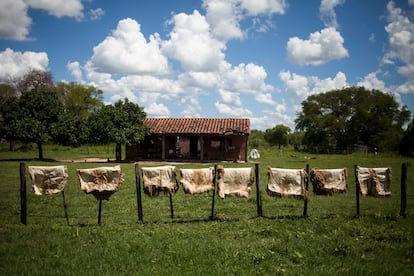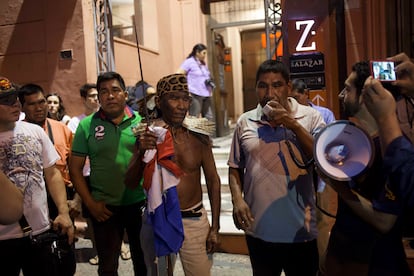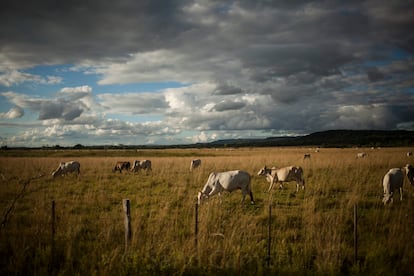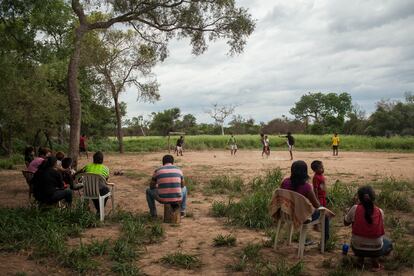Luxury cars will have to do without Paraguayan leather because of pressure from the Ayoreo people
The Italian company Pasubio, which sells upholstery to brands such as Jaguar, Land Rover and BMW, will no longer buy leather from suppliers that invade Indigenous peoples’ forests

Do you know where the leather used for the seats and steering wheels of the most expensive cars comes from? Brands like BMW, Citroen, Jaguar, Land Rover, Peugeot and Porsche buy it from the Italian company Pasubio, the largest leather importer in Paraguay, where the Ayoreo Indigenous people have been fighting for decades to stop the deforestation of their lands by cattle ranchers.
The work of Ayoreo land stewards and their dialogue with political actors in Paraguay and abroad has borne new fruit: the Pasubio company has announced that it will stop buying Paraguayan leather from suppliers who invade and deforest the Indigenous group’s land, where their relatives live in voluntary isolation in the Gran Chaco, South America’s second-largest continuous forest.
In recent decades, the political and legal struggles of this Indigenous people, a population of some 7,000 people between Paraguay and Bolivia, has successfully preserved hundreds of thousands of hectares of forest. But their leaders, lawyers and dozens of Paraguayan and international organizations report that cattle ranchers’ illegal invasion continues with impunity amid the local authorities’ rampant corruption.
Earlier this month, the Italian tannery Pasubio, one of the leading companies in its sector, announced its decision to refrain from buying leather “from suppliers whose activities directly or indirectly threaten the forests inhabited by uncontacted Indigenous Ayoreo people in Paraguay.”
Pasubio’s decision comes following 20 years of demands by the Ayoreo people, which obtained a restraining order from the Inter-American Commission on Human Rights in 2016 that requires the Paraguayan state to protect their forests and territory. A year ago, the NGO Survival denounced this company along with another corporation called Gruppo Mastrotto before the Organization for Economic Cooperation and Development (OECD).
Survival then sent injunctions to both Italian companies, urging them to stop these imports. Gruppo Mastrotto responded, initiating an ongoing dialogue with the NGO. However, at the time, Pasubio limited itself to sending a brief disclaimer, so, with the support of the Ayoreo people living outside the forest, Survival filed a formal complaint with Italy’s National Contact Point (NCP) at the OECD, the body that promotes implementing the organization’s guidelines for multinational companies.
“It seems to me an opportune decision that could have an impact at the local level,” Tagüide Picanerai, a leader of the affected Ayoreo people, told EL PAÍS after learning of Pasubio’s press release.

South America’s second largest — but unknown — forest
The Chaco is so large that it spans Paraguay, Bolivia, Argentina and Brazil: it has dry forests of centuries-old trees, savannas and wetlands inhabited by 15 different Indigenous peoples, as well as jaguars and other endangered animals.
The Ayoreo people are unique in the Americas. All other Indigenous communities who live in voluntary isolation are located in the continent’s other large continuous area of forest, the Amazon Basin.
The Ayoreo were practically the last natives to come into direct contact with colonization in this region of South America. That is attributed to the thorny and harsh nature of the Chaco, and to the bravery and ferocity of its inhabitants, which kept most European expeditions from entering these forests until well into the 18th century.
The problem is that some Ayoreo groups have not yet voluntarily made such contact. Paraguayan and international legislation ensures the territory’s original inhabitants’ right of self-determination. If they do not want or need contact, the surrounding society must respect their decision. In addition, it must work to preserve that territory. Some of them are relatives of Tagüide, whose parents were forced to leave the forest in the 1980s.
The Pasubio Group’s press release states that the company “will halt all commercial relationship with any Paraguayan supplier unable to provide appropriate guarantees regarding the absence of any relationship, direct or indirect, with the cattle ranches located within the PNCAT [Ayoreo Totobiegosode Natural and Cultural Heritage].” However, it does not indicate the producers to which it is referring.
But Tagüide, a schoolteacher who is nearly licensed as a lawyer, wonders how they are going to check that their suppliers are not encroaching on Ayoreo territory or other Indigenous peoples’ lands. “It makes me a bit doubtful about this matter,” he says.

An investigation by the NGO Earthsight demonstrated the link between the leather used in the automotive industry and the illegal destruction of the Ayoreo forest. In two reports, Grand Theft Chaco I and Grand Theft Chaco II, Earthsight revealed that almost two-thirds of the hides exported from Paraguay go to Italian companies, mainly Pasubio, whose annual revenues of €313 million (over $346 million) depend 90% on the automobile industry.
According to these reports, between 2018 and 2019, a farm belonging to the Caucasian S.A. company and another one belonging to an associate of the Chortitzer Cooperative illegally deforested 2,700 and 500 hectares, respectively, from the Ayoreo people’s reserve in violation of government resolutions. A third farm, owned by the Yaguareté Porã company, has also been logging and invading this territory with cattle for some 20 years.
Earthsight detailed how a pervasive culture of corruption and inaction had taken root in Paraguay’s Ministry of Environment, enabling farms to receive irregular deforestation permits that were often granted after the forests had already been cleared.
“We are pleased that Pasubio has committed to boycotting leather from suppliers that threaten the lives and territories of the Ayoreo people in Paraguay, and we hope that other companies will follow suit,” said Survival’s director, Caroline Pearce.
In 2001, the Paraguayan government formally recognized a territory of 550,000 hectares as “Ayoreo Totobiegosode Natural and Cultural Heritage” (PNCAT). However, to date the authorities have transferred only about one-fifth of the land they promised.
According to the testimonies of the Ayoreo who left the forest, along with available anthropological studies, those who live in voluntary isolation survive by hunting wild boar, gathering fruit and making flour from carob trees. They have a predilection for wild honey and turtle soup. They are nomadic and assiduously cross the border with Bolivia using wooden clogs, clay pots and caraguatá textiles, some of which are so useful for sitting on the ground that a European company has already copied them.
Their last major contact with the outside world occurred in 2004, when several Ayoreo left, frightened by the noise of the power saws cutting logs and chased by hunters’ gunfire. In 2021, some of them approached a village where already-settled Ayoreo people live, talked to them and left. They asked them to stay in the forest. “The ranchers know perfectly well that there’s a restraining order on this territory, but they still present projects to the Ministry of the Environment to produce meat here, and the ministry authorizes them in violation of the law,” Picanerai says.
Leather from the cows that overrun Ayoreo lands comes from tanned hide prepared for industrial use, which later ends up as steering wheels or seats in European cars. And if there is one thing Paraguay does have, it is cows. Indeed, there are twice as many bovines as there are people. The country also has a lot of territory, as much as France, but for just 6.1 million inhabitants. It is not even necessary to invade the few remaining forest reserves in an area that has one of the world’s highest rates of deforestation.

But that activity earns some $1.7 billion a year. So, who owns the land where the cows graze? Approximately 2.5% of Paraguay’s population owns 85% of the country’s arable land, an inequality that is made explicit in the Chaco. In Paraguay, most of these large landowners are officials and military officers who were involved in South America’s longest dictatorship, the Alfredo Stroessner regime (1954-1989); during that time, they stole and divided between 8 and 22 million hectares of land (three times the size of Panama) that belonged to Indigenous peoples, peasant cooperatives and their opponents.
“The powerful people behind the leather industry in Paraguay should know that the world will not stand idly by and watch the illegal destruction of the Chaco forest and its people for profit. […] The Paraguayan authorities must respect national and international law once and for all, expel all the haciendas from Ayoreo territory and return the land to the Indigenous people,” Pearce asserted.
Until the 1990s, the Stroessner dictatorship denied the existence of the Ayoreo people and persecuted them. It had them killed in manhunts. In the 2000s, cattle ranchers’ unions and even some government officials still denied the existence of the centuries-old people.
Today, thanks to the courage of their leaders, the work of social researchers, journalists and even filmmakers, the Ayoreo people’s message of preserving the Chaco’s forests is spreading around the world. Now, no one can deny their existence. Pasubio’s decision is a step toward respecting this people’s rights and holding those who violate them accountable.
Sign up for our weekly newsletter to get more English-language news coverage from EL PAÍS USA Edition
Tu suscripción se está usando en otro dispositivo
¿Quieres añadir otro usuario a tu suscripción?
Si continúas leyendo en este dispositivo, no se podrá leer en el otro.
FlechaTu suscripción se está usando en otro dispositivo y solo puedes acceder a EL PAÍS desde un dispositivo a la vez.
Si quieres compartir tu cuenta, cambia tu suscripción a la modalidad Premium, así podrás añadir otro usuario. Cada uno accederá con su propia cuenta de email, lo que os permitirá personalizar vuestra experiencia en EL PAÍS.
¿Tienes una suscripción de empresa? Accede aquí para contratar más cuentas.
En el caso de no saber quién está usando tu cuenta, te recomendamos cambiar tu contraseña aquí.
Si decides continuar compartiendo tu cuenta, este mensaje se mostrará en tu dispositivo y en el de la otra persona que está usando tu cuenta de forma indefinida, afectando a tu experiencia de lectura. Puedes consultar aquí los términos y condiciones de la suscripción digital.








































